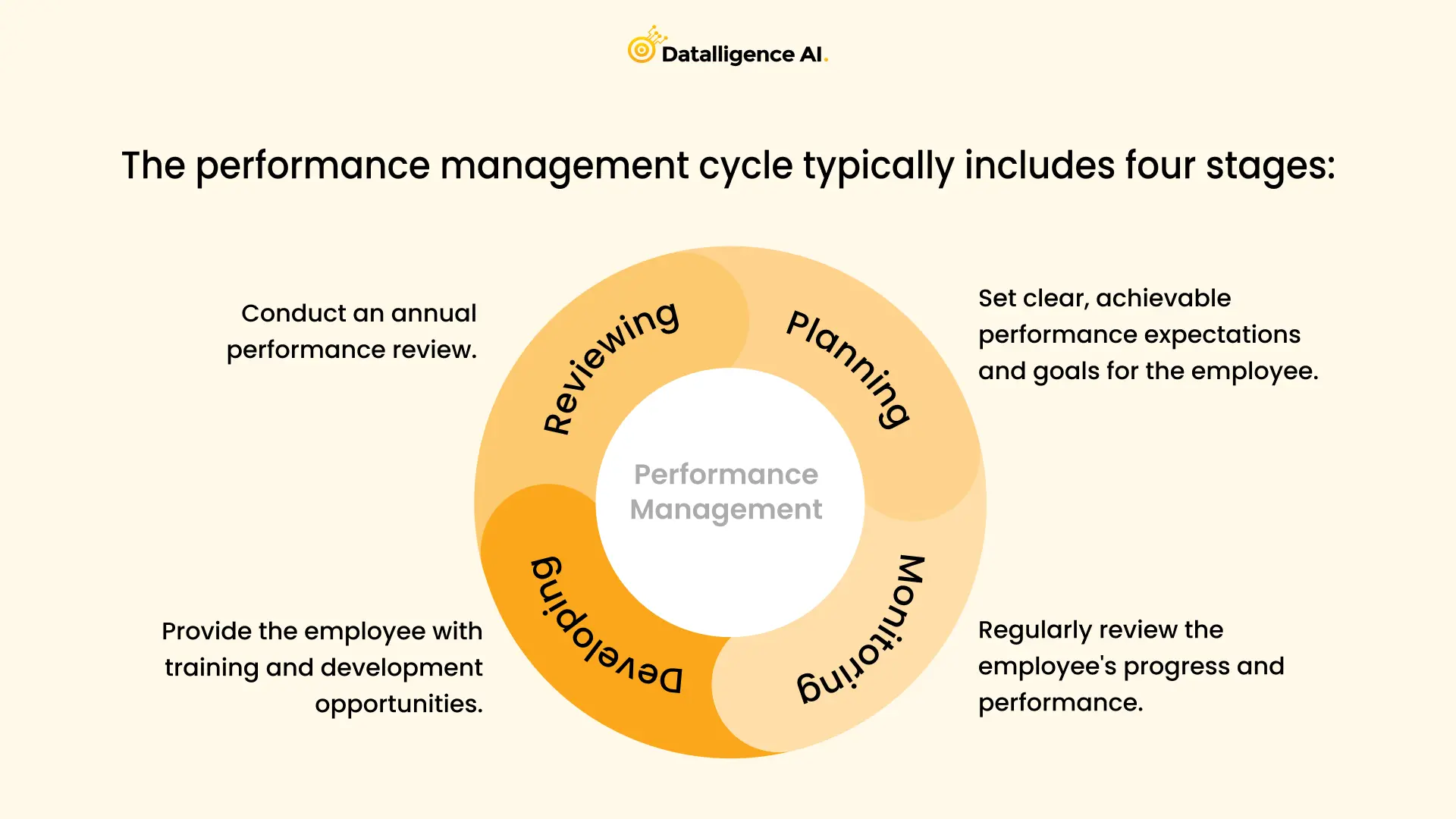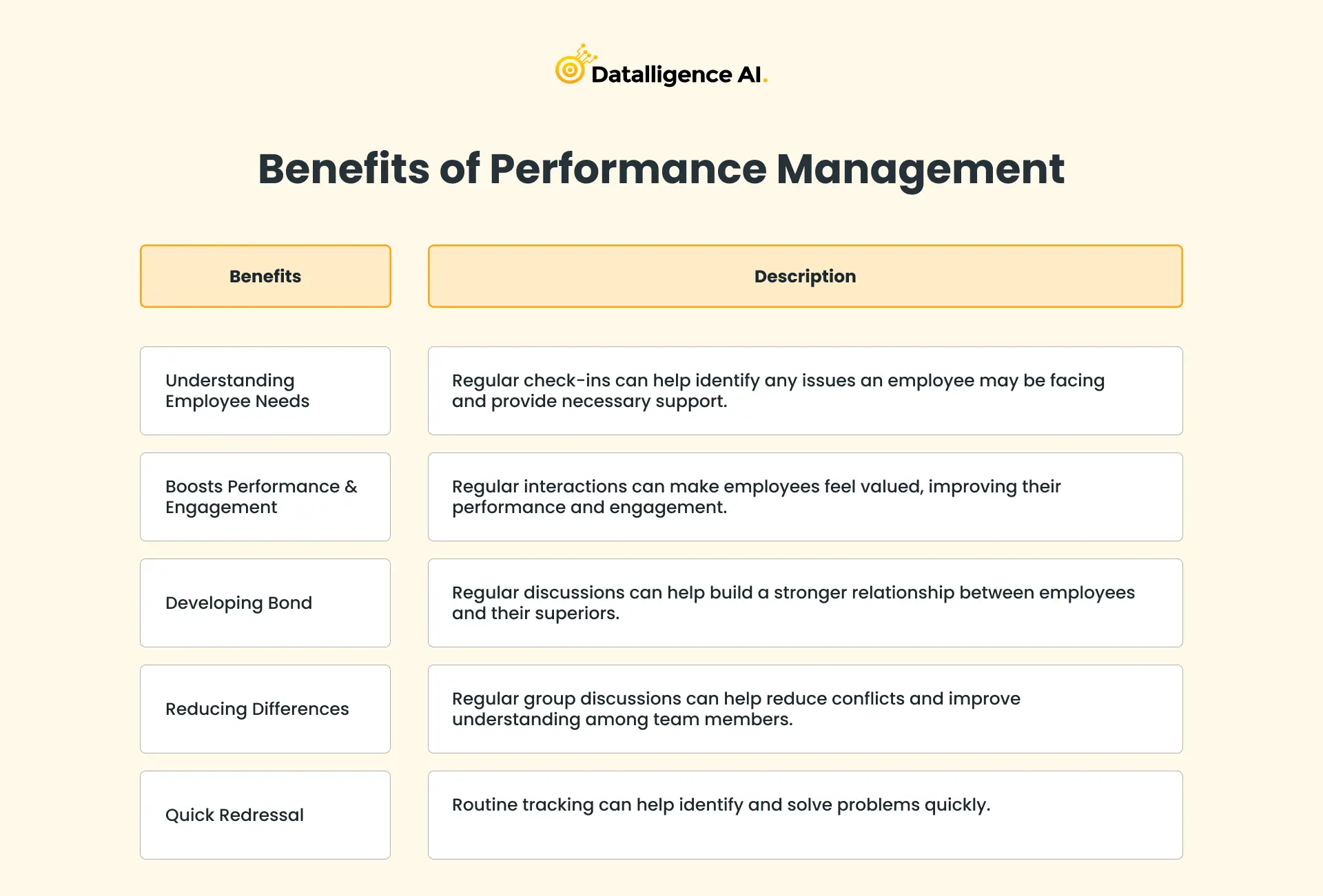Performance management has always been a critical component of any successful organisation’s strategy. However, in the high-stakes, fast-paced world of startups, the importance of an effective performance management cycle cannot be overstated.
This blog will delve into the intricacies of performance management, outlining its importance and best practices, particularly in the startup environment.
What is Performance Management?
Performance management is basically like the playbook for how companies make sure everyone’s pulling their weight and helping the team score those big wins. It’s all about getting employees involved in making the company better at what it does, whether that’s selling widgets or saving the world. And the performance management cycle? Think of it as the roadmap for keeping track of how everyone’s doing throughout the year, kind of like checking in on your progress to see if you’re hitting those goals or if you need to switch up your game plan.
The performance management cycle typically includes four stages:

This cycle is designed to be a continuous loop, signifying that performance management is an ongoing process.
Why Startups Must Need a Performance Management System?
Startups are often characterised by their dynamic, fast-paced environment. The focus is usually on growth, innovation, and survival. In such a setting, it might seem like performance management may not be a top priority. However, this perception couldn’t be further from the truth.
Performance management in startups is essential for several reasons:
- Goal Alignment: Startups need to ensure that all employees, regardless of their role, are working towards the same goals. A performance management system can help clarify these objectives and align them with the company’s overall goals.
- Employee Development: Startups are typically lean operations, meaning that every employee’s performance can significantly impact the company. By investing in performance management, startups can identify skill gaps, provide training, and support their employees’ growth.
- Motivation and Engagement: A structured performance management process can boost employee motivation and engagement by providing clear career progression paths and recognizing and rewarding good performance.
- Attracting and Retaining Talent: A well-implemented performance management system can make a startup more attractive to high-performing talent. It sends a clear message that the company values its employees and invests in their development.
Best Practices in Performance Management System for Startups
Implementing effective performance management practices is crucial for startups to foster a high-performing workforce and drive organizational success. Here are some best practices that startups can adopt:
Align Goals with Organizational Objectives
Startups should ensure that individual and team goals are closely aligned with the company’s overall strategic objectives. This alignment ensures that everyone is working towards the same priorities and maximizes the impact of their efforts. Involve employees in the goal-setting process to promote ownership and accountability.
Embrace Continuous Feedback
In the fast-paced startup environment, continuous feedback is essential for course correction and improvement. Encourage open communication and create a safe space for employees to receive and provide feedback. Implement tools and platforms that facilitate real-time feedback exchange, such as weekly check-ins or peer-to-peer feedback systems.
Leverage Technology
Leverage technology to streamline performance management processes and enhance data-driven decision-making. Implement software tools that automate goal-setting, progress tracking, and performance reviews. These tools can also provide valuable insights through analytics and reporting, enabling data-driven talent management strategies.
Promote Transparency and Fairness
Ensure transparency and fairness in the performance management process by clearly communicating expectations, evaluation criteria, and decision-making processes. This fosters trust and buy-in from employees, promoting a sense of fairness and accountability.
Offer Personalized Development Opportunities
Recognize that each employee has unique strengths, weaknesses, and career aspirations. Tailor development opportunities, such as training programs, mentorship, or stretch assignments, to address individual needs and support professional growth.
Recognize and Reward Excellence
Implement a robust recognition and reward system that acknowledges and celebrates outstanding performance. This can include monetary incentives, public recognition, or non-monetary rewards like additional time off or opportunities for professional development.
Foster a Growth Mindset
Cultivate a growth mindset within the organisation by encouraging learning from failures and embracing challenges as opportunities for growth. Provide a supportive environment where employees feel safe to take calculated risks and experiment with new ideas.
Examples of Effective Performance Management Practices in Action
Let’s look at some real-world examples of effective performance management practices in startups:
- Google: Google uses the Objectives and Key Results (OKRs) framework to measure performance. Each employee sets their own OKRs, and these are reviewed quarterly. This method gives employees a clear understanding of their goals and how they align with Google’s overall objectives.
- Facebook: Facebook uses a peer review system where employees receive feedback from their colleagues. This method encourages transparency and allows for a more holistic view of an employee’s performance.
- General Electric: GE uses a flexible framework for performance reviews that allows for adaptability and change. This includes regular check-ins and feedback sessions, as well as an annual review.
- Valve Corporation: Valve has developed a tool called ‘Kudos’ that allows employees to recognize each other’s work, fostering a culture of recognition and appreciation.
19 Best Practices of Performance Management in Startups
Establishing an effective performance management system in a startup environment requires a strategic approach that aligns with the organization’s unique needs and culture. Here are 19 best practices to consider:
- Identification of Purpose: Understand what you want to achieve through performance management.
- Schedule Regular Check-ins and Discussions: Implement regular check-ins and discussions between managers and employees to track progress, address challenges, and provide ongoing feedback. These frequent touchpoints foster open communication and enable timely course corrections.
- Objective & Key Results (OKRs): Allow employees to set their own OKRs and have open discussions about them.
- Assigning Explicit Roles: Clearly define each team member’s role and responsibilities.
- Changing Goals as per Performance: Adjust goals as necessary based on an employee’s performance.
- Regular Interactions and Discussions: Have regular check-ins and discussions about progress and any difficulties.
- Routine Checks: Regularly review performance using metrics and analytics.
- Actionable Feedback: Provide clear, timely, and actionable feedback.
- SOP or Guidelines for Improvement: Develop standardized protocols for dealing with common issues.
- Regular Training Sessions: Regularly train both employees and managers in new methods and techniques.
- Multiple Feedback Sources: Use multiple sources for feedback, including performance management software, feedback from seniors, and peer reviews.
- Moving to Another Side of the Table: Consider the employee’s perspective when analysing problems.
- Open & Frequent Rewards: Recognize and reward high performance openly and frequently.
- Motivating Low Performers: Motivate low performers and help them improve.
- Re-evaluation of Targets Using KPIs: Use Key Performance Indicators (KPIs) to re-evaluate targets.
- Building Trust: Build trust with employees by involving them in performance management plans.
- Inviting Opinions: Share the results of performance management analyses with employees and invite their opinions.
- Performance Management Software: Use performance management software to streamline the process.
- Continuously Evaluate and Refine: Regularly evaluate and refine the performance management system based on feedback, data insights, and changing organizational needs. A flexible and adaptable approach ensures that the system remains relevant and effective in supporting the startup’s growth and success.
5 Importance of Implementing a Performance Management System
A well-designed performance management system offers numerous benefits that are crucial for startups to thrive in a dynamic and competitive business landscape. Here are five compelling reasons why implementing an effective performance management system is essential:
- Aligning Efforts with Strategic Goals:
- A robust performance management system ensures everyone is on the same page, working towards the company’s goals. It maximises individual contributions, driving the organisation forward.
- Fostering a High-Performance Culture:
- By setting challenging goals and providing continuous feedback, startups cultivate an environment of innovation and excellence. Employees are motivated to deliver their best work, pushing boundaries for success.
- Attracting and Retaining Top Talent: With a focus on employee growth and development, startups create a compelling proposition for top professionals. Opportunities for advancement and recognition enhance retention in a competitive market.
- Enabling Data-Driven Decision-Making
- : Performance management systems provide valuable insights for resource allocation and talent management. Data-driven decisions ensure investments yield the highest returns, driving organisational success.
- Facilitating Continuous Improvement:
- In rapidly evolving markets, a structured approach to improvement is crucial for staying competitive. Performance management systems foster a culture of learning and adaptation, keeping startups agile and responsive.
Challenges in Performance Management for Start-Ups.
- Changing KPIs: In a dynamic startup environment, Key Performance Indicators (KPIs) may need to be adjusted frequently.
- New Responsibilities and Goals: As the startup grows and evolves, employees’ responsibilities and goals will also change.
- Resource Constraints: Startups often operate with limited resources, making it challenging to implement a comprehensive performance management system.
- Lack of HR Expertise: Many startups do not have dedicated HR personnel or expertise, making it difficult to develop and manage performance management processes.
Solution
Navigating performance management in startups can feel like surfing a wave of constant change, with KPIs shifting like the tides and responsibilities morphing faster than you can say “unicorn. Flexibility is your secret weapon, so ditch the rigid goals for agile, adaptable ones that can pivot with your startup’s journey. Keep those communication channels wide open to ensure everyone’s on the same page as roles evolve and new goals emerge. And when resources are tight and HR expertise is scarce, get creative and lean on tech solutions, up-skill your team, or call in freelance HR superheroes to save the day. Remember, you’re not just managing performance, you’re shaping the future of your startup – so embrace the chaos and keep riding that wave to success!
Benefits of Performance Management

Conclusion
Performance management is a vital component of a startup’s strategy for growth and success. The performance management cycle, when correctly implemented, can align goals, boost employee performance, and foster a culture of continuous improvement and development.
At Datalligence, we understand the challenges startups face in implementing effective performance management. Our solutions are designed to assist startups in setting up a performance management system that not only meets their unique needs but also adapts as they grow and evolve. By leveraging our expertise, startups can navigate the challenges of performance management and unlock their potential for success.
FaQ
What are the four phases comprising the performance management cycle?
The four stages are Planning, Monitoring, Developing, and Reviewing. This cycle involves setting goals, monitoring progress, providing support for improvement, and evaluating performance outcomes.
What is the significance of the performance management cycle in startups?
The performance management cycle in startups ensures alignment of employee efforts with business objectives, facilitates regular feedback, and aids in identifying areas for growth and improvement early on, crucial for sustainable growth.
How does performance management cycle differ in startups compared to established companies?
In startups, the performance management cycle often emphasises agility and adaptability, focusing on rapid iteration, continuous learning, and fostering a culture of innovation to navigate the dynamic nature of early-stage ventures.
What are the key components of effective performance management in startups?
Effective performance management in startups involves clear goal setting, regular feedback loops, fostering a supportive and transparent culture, and leveraging technology tools to streamline processes and facilitate data-driven decision-making for optimal performance and growth.











